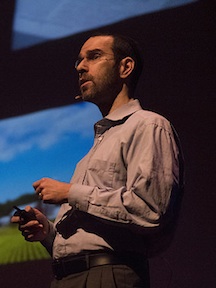By Kristy Ju
On November 3, 2014, Purdue University in Indiana held TEDxPurdueU, an independently-organized TED event. The Breakout Session was called “Confronting Our Environmental Health Risks,” which aimed to “acknowledge, assess, and confront the complex health risks facing us all, both locally and globally,” according to Purdue University’s website.
Phi Beta Kappa member Daniel P. Aldrich presented a speech titled “What Can Renewables Learn from Nuclear Power?” Aldrich shared how national regulations and social opposition crippled the utility industry’s attempts at building nuclear power. Only half of the 200 nuclear power plant projects that were announced in the United States during the post-war era were ever built.
One highlight from his talk: “More civic engagement meant less chance of nuclear plants coming online.”
Aldrich, an associate professor of Political Science, University Scholar, Director of Asian Studies at Purdue University, researches post-disaster recovery. Some of his areas of expertise include disasters and resilience, civil society and the state, and countering violent extremism.
Aldrich received his B.A. at the University of North Carolina at Chapel Hill in Asian Studies in 1996. He received his M.A. in Asian Studies at the University of California at Berkeley in 1998 and his second M.A. in Government at Harvard University in 2001. In 2005, Aldrich earned his Ph.D. in Government from Harvard and headed to Tulane University, in New Orleans, to begin his assistant professorship in Political Science.
This was the same year that Hurricane Katrina devastated New Orleans and much of the Gulf Coast.
Aldrich and his family lost their home, car, and all of their material possessions. After this event, he travelled to Japan, India, and the American Gulf Coast to study how communities and neighborhoods become resilient in the aftermath of disasters.
He published Building Resilience: Social Capital in Post-Disaster Recovery (University of Chicago Press, 2012), sharing his insights of how a community’s social capital determines the resilience or disrepair after a crisis. Aldrich analyzed the responses to natural disasters in four communities – Tokyo following the 1923 earthquake, Kobe after the 1995 earthquake, Tamil Nadu after the 2004 Indian Ocean Tsunami, and New Orleans after Hurricane Katrina.
He found that the communities that had strong social networks, beyond that of national or international aid, recovered and reconstructed most successfully. Other key elements that determine the success of disaster relief include the speed of disseminating information and financial and physical assistance.
Correlating the strength of social capital in protesting the construction of nuclear power plants from Aldrich’s Tedx Talk, the importance of robust social networks can also be seen in the successful recovery of natural disasters.
Among his contributions to the New York Times, CNN, and NPR, he has also published more than 26 peer reviewed articles and more than 60 book chapters, reviewers, and OpEds. He has held posts as a Fulbright Research Fellow, an Abe Fellow at Tokyo University, and an AAAS Science and Technology Fellow with USAID.
His research on how the strength of social networks can lead to social changes embodies Phi Beta Kappa’s principles of “freedom of inquiry and liberty of thought and expression.”
Kristy Ju is a senior at University of Mary Washington majoring in English and minoring in linguistics. She became a member of Phi Beta Kappa in her junior year. University of Mary Washington is home to the Kappa of Virginia Chapter of Phi Beta Kappa.




